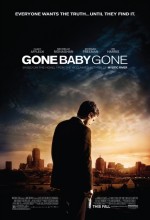2007 // USA // Ben Affleck // December 27, 2007 // Theatrical Print
B - In a year that gave us Zodiac, I almost feel bad for other crime thrillers. David Fincher's masterpiece is a hard act to follow. Despite the long shadow over the genre in 2007, however, Gone Baby Gone stands as a remarkably effective work, shot through with flashes of genuine virtuosity. It's a sleek slice of noir filmmaking that showcases the flowering talent of Casey Affleck and a captivating, blistered performance from Amy Ryan. Just as interesting is what the film portends for the future work of its director, an Oscar-winning screenwriter who does a bit of acting on the side. You may have heard of him? Ben Affleck?
Set in the multi-ethnic working-class Boston neighborhood of Dorchester, Gone Baby Gone chronicles the efforts of young private investigators Patrick Kenzie and Angie Gennaro, hired to search for Amanda McCready, a missing four-year-old girl. Kenzie and Gennaro are a far cry from the hardboiled gumshoes of a previous era. Skinny local kids, they've built a middle class life in a shabby, crime-plagued urban neighborhood by finding people that the police can't—or won't—find. Kenzie is a deceptively confident and upright guy, but he lives in a shadowy territory where his drug dealer contacts sometimes request his assistance on questionable errands. Gennaro is Kenzie's backup, not quite his equal in their dangerous line of work, but capable of selfless fortitude when it is required of her. Their effectiveness as investigators is rooted in their familiarity and attachment to their neighborhood, but their reputation as local do-gooders has its drawbacks.
Casey Affleck shines for the second time this year, bringing sensitivity and credibility to Kenzie from unlikely angles. It's nothing close to his career-defining turn in The Assassination of Jesse James by the Coward Robert Ford, but his presence is a haunted, sharply outlined upgrade to nearly every scene. Amy Ryan is sweeping year-end awards left and right for her portrayal of Amanda's mother Helene, a broken, repulsive woman, full of juvenile defiance. I haven't seen many reviewers note the commendable physicality of Ryan's performance, which is entirely believable and never garish. She disappears into the role, but credit is also due to the wonderfully written part itself, which forgoes abrupt character turns for moments of authentic revelation. The casting of Morgan Freeman has lately become a lazy shortcut to paternal credibility. It's therefore a small pleasure to see his police captain evolve into a more complicated character as the film plays out.
Gone Baby Gone is one of five novels by Dorchester native Dennis Lehane that feature Kenzie and Gennaro. In terms of its story and structure, the film is fairly unremarkable, and in more mercenary hands it might have dipped into outright banality. Granted, what Lehane's tale does well, it does extraordinarily well. Namely, it utilizes the ambiguous, gritty conventions of hardboiled fiction to grapple with the place of children in America's urban wastelands (both material and moral). It's a shame, then, that those same conventions drag Gone Baby Gone down in places, rendering it inert whenever the filmmakers and performers go through the obligatory crime drama motions. The truth becomes extremely convoluted as the film progresses. It marches through successive tiers of exposition and flashbacks that border on tiresome in order to reach its resolution. Fortunately, that resolution is ultimately satisfying and vital to Gone Baby Gone's thrust.
First time director Ben Affleck exhibits a steady and oddly seasoned hand in realizing the cruel themes and clear sense of place from the source material. The native Affleck has obvious affection for blue-collar Boston, warts and all, and he focuses his sentimentality to good effect here. It finds resonance in Gone Baby Gone's fascination with locality and its entangling effect on devotion and responsibility. Affleck displays a modest, performer-centered style that echoes that most un-auteur of American auteurs, Clint Eastwood. Affleck is keenly aware that he is sketching a grubby moral rumination. While his private eye protagonists are endangered, often dizzyingly so, he skillfully focuses the tension on Amanda's fate and the nagging ache of unresolved mystery, rather than on Kenzie and Gennaro themselves. Gone Baby Gone's cinematographer and frequent Cameron Crowe collaborator John Toll has some duds on his record, but his bragging rights include visual triumphs such as The Last Samurai and The Thin Red Line. In Gone Baby Gone, Toll blends the tenebrous, greasy-gothic qualities of Fincher with the Michael Mann's cool, pitiless eye for urban landscapes.
The admirable performances and Ben Affleck's confident direction elevate Gone Baby Gone above rote crime drama strictures. It's a refreshing inaugural accomplishment from Affleck, and a tantalizing peek at his talent for empathetic and vigorous storytelling.





